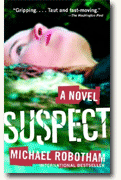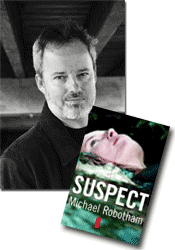An Interview with
Michael Robotham
Interviewer Luan Gaines:What was the inspiration for Suspect?
Michael Robotham:Many years ago, while writing a story about a social worker in the North of England, she told me how that day she had taken a newborn baby away from a young woman who a judge had ruled was incapable of looking after a child. The mother was inconsolable as the baby was wrenched from her arms. As the social worker carried the infant away, she looked down and asked herself, "What if one day, years from now, you come looking for me? Will you thank me for having saved your life or blame me for having ruined it?"
Psychologists, social workers and judges often decide the fate of entire families. They play god with other people’s lives…but what if they get it wrong. This is the question at the heart of Suspect.
How do O'Loughlin's strengths as a therapist work against him in a police investigation that points his guilt?
I think Joe’s idealism and his confidence in his own abilities work against him. He believes he can tell if someone is lying. He believes he can control a dangerous patient. At the same time, he never has quite enough evidence to be sure of his fears. That’s why he doesn’t act sooner.
Is O'Loughlin invested in his patients to the point where he is blindsided by the danger of withholding evidence?
Psychologists and therapists invest a great deal in their patients in a bid to win their trust. At the same time they are bound by very strict rules, like doctors, regarding client confidentiality. Joe withholds evidence because he doesn’t want to break these rules and he doesn’t want to think the worst of his patients. His job is to help them, not abandon them.
As the author, why did you add the burden of Parkinson's Disease to O'Loughlin's already full plate? In service to the plot?
Joe has the perfect life with a beautiful wife, clever daughter and a brilliant career – all of which unravel in spectacular fashion in Suspect. I know that the diagnosis of early onset Parkinsons’s Disease seems almost too cruel but I wanted Joe’s predicament to be hopeless. His entire world is falling apart and he can’t even rely on his body because that too is abandoning him.
Joe keeps secrets from his wife, Julianne, and she is on his side. Doesn't he realize that this is a dangerous habit in a marriage?
I don’t think Joe keeps secrets from Julianne – not as a rule. Their marriage has always been strong – although under pressure because Julianne wants another baby. Suddenly, Joe is diagnosed with Parkinson’s Disease and the future looks very different…scary. Like a lot of men, Joe internalizes his worst fears. He wants to protect his family, not burden them.
Has O'Loughlin developed a pattern in the blurring of lines in his practice over the years, especially with the nurse, Catherine McBride, who is found murdered?
I don’t know if I fully understand this question. I assume you’re referring to Catherine’s self-mutilation and the fact that Joe doesn’t report her to her bosses and get her fired. This again comes back to patient confidentiality, along with Joe’s desire to help Catherine and not destroy her career. He is just trying to do the right thing.
Did Catherine McBride's accusations damage Joe's relationship with his wife?
I don’t think it damaged their relationship because Joe was very open about what happened at the time. He told Julianne about the accusations and explained what happened. However, there may just have been the tiniest seed of doubt planted in her mind. She trusted Joe, but perhaps not his patients.
Was Julianne right to doubt her husband's veracity?
One of the great things about Joe is that he is fallible. He makes mistakes. He is an ordinary man under extreme pressure. Yes, he told he a lie. Without wanting to get Biblical on readers, I don’t think anyone should be casting stones.
Is the very sensitivity that works so well in treatment the trait that gets O'Loughlin in trouble with Detective Ruiz?
Absolutely. The compassion Joe shows to his patients and his desire to protect them, makes him seem defensive; as though he might be hiding something.
Regarding the differences between their jobs, Detective Ruiz says: "A sob story about a lousy childhood and you're ready to put someone in therapy for ten years. I deal with facts and right now they're all pointing to you." Does Ruiz dislike/distrust O'Loughlin from the start?
Detective Ruiz distrusts Joe because the Professor hasn’t been entirely honest in their dealings. He dislikes him for another reason – based more on class and wealth. Ruiz has working class roots, while Joe has come from a wealthy background of private schools and university. At one point Joe says to Ruiz,
‘You don’t like me, do you?’
‘Not particularly.’
‘Why?'
‘Because you think I’m a dumb, foul-mouthed plod who doesn’t read books and thinks the theory of relativity has something to do with inbreeding.’
O'Loughlin makes ill-advised assumptions about his patients' motives and those of his immediate family, generally trapped by his own thought processes. Doesn't the therapist unnecessarily complicate his life with these actions?
Therapists don’t always get it right – in their consulting room or in their bedrooms. In this case Joe is confronted, perhaps for the first time, with someone who is cleverer than he is. And it’s hard to think straight when you’ve been diagnosed with Parkinson’s Disease.
 The diagnosis of Parkinson's Disease deals O'Loughlin a stunning blow. How much of his erratic behavior stems from the inability to accept the limitations of his illness?
The diagnosis of Parkinson's Disease deals O'Loughlin a stunning blow. How much of his erratic behavior stems from the inability to accept the limitations of his illness?
Imagine yourself in the same situation – in your early forties, diagnosed with a debilitating, chronic and progressive disease that will destroy your quality of life and shorten it dramatically. I think it would knock most people sideways – at least at the beginning. Depression, self-pity, anger and erratic behavior – I can see it all.
Can you speak to O'Loughlin's ambivalence about this patient, given Bobby's penchant for lying, abrupt emotional outbursts and increasing violent acts?
The only patients Joe is ambivalent about are those who treat psychologists as professional listeners who hear the complaints your spouse won’t listen to.
Does Joe bear guilt over Catherine McBride's death, that he did not help the troubled young woman? Is that why he expends so much emotional energy on Bobby Moran?
Joe doesn’t feel guilty about Catherine but he is a very compassionate man and therefore feels sadness and regret. He expends so much emotional energy on Bobby because he is frightened of what he is capable of. It may be that his psychological hold on Bobby is the only thing stopping him hurting someone else.
Even when the evidence is piling up, Ruiz gives O'Loughlin an opportunity to clear his name. Does Ruiz believe O'Loughlin is guilty or does he harbor doubts?
The rules of evidence are very strict on how long a suspect can be held without charge. Perhaps, in the back of Ruiz’s mind, there is also the belief that Joe will implicate himself by trying to run or cover his tracks. It’s a case of giving a man enough rope to hang himself.
How does his developing Parkinson's lead to dangerous situations for O'Loughlin, in a purely physical sense, as he tries to gather evidence about the real murderer?
I chose Parkinson’s Disease because it attacks the body and not the mind. Joe can’t fight his way out of trouble. He has to think his way out.
Joe has a brilliant mind and whatever happens he will still be able to live in the space between his ears. In a sense I pictured him as being a little like Prof. Stephen Hawking, a modern day Einstein with a wasted body, trapped in a wheelchair.
O'Loughlin is confronted with a serious crisis, fighting for his life on two fronts. How do his health issues impact the fight to clear his name? Is the disease exacerbated by O'Loughlin's dire circumstances?
(see above) The disease is exacerbated by his predicament. Stress is one of the major accelerants for Parkinson’s Disease.
Does O'Loughlin's professional relationship with Bobby Moran cause the therapist to question his effectiveness as a healer of minds?
Perhaps Joe will be more careful and less trusting in the future but Joe discovers in Bobby an intellect equal to his own and a pathological liar who shows no signs of deceit. Readers also have to understand that psychology is not a science of absolutes. The human mind and human behavior are among the last great unexplored frontiers.
In terms of defining boundaries and methodology, is the success or failure of Bobby's therapy pivotal for O'Loughlin? Why/ why not?
Sometimes clinical psychologists are confronted with patients who have committed no crime (or only minor crimes) but are capable of enormous violence and destruction. Society can’t lock people up because of their dreams or fantasies. Sometimes it falls upon people like Joe to hold them in check clinically and keep them from doing harm.
With his flawed humanity and willingness to question his own actions, O'Loughlin is an extremely likeable character. What is it about this guy that keeps us rooting for him?
The answer is in the question. We keep rooting for Joe because he is a flawed human being – just like the rest of us. And when his life begins falling apart and all that he loves is threatened, we feel for him because we think to ourselves…there but for the grace of God…
Suspect was chosen as a Book-of-the Month-Club Main Selection, Mystery Guild and Doubleday Book Club Main Selection. What are your thoughts about your next novel, given the success of this one?
Wow! It’s a big rap to live up to. Second novels are probably more important than debut novels because everybody is looking to see if the writer can do it again. They want to know if I’m a one-hit wonder or a one-trick pony. Second novel-syndrome (sophomore syndrome as my New York editor calls it) is something I hope to avoid. I’m sure readers will let me know if I succeed.
Ruiz is the perfect foil for O'Loughlin, both men quirky and idiosyncratic. Do you have plans for these two in the future?
Detective Ruiz is the narrator of my new novel Lost (not to be confused with the TV series). The story is told through his eyes as he lies in a hospital bed with a bullet in his leg and no memory of how he got there. A seven-year-old girl is missing and so is the ransom. Joe uses his skills as a clinical psychologist to help Ruiz relive that night and remember what happened.
Any advice for would-be writers?
Write, write, write and then when you’re totally fed up with it, write some more. Should you have any time left read books and dissect them chapter-by- chapter. What makes them work? Where do they fall down? Occasionally, you will read something that is so heartbreakingly good that you’ll want to give up because you’ll feel you can never reach such heights, but persevere. There’s only one Gabriel Garcia Marquez.
Michael Robotham is a former journalist and the co-author of a dozen bestselling autobiographies published in the United Kingdom. He lives in Sydney, Australia.
Contributing reviewer Luan Gaines interviewed Michael Robotham, author of Suspect (see accompanying review), about his book via email for curledup.com. This text is the property of Luan Gaines and the author for whom it is intended. No part may be reproduced without permission. Luan Gaines/2004.


